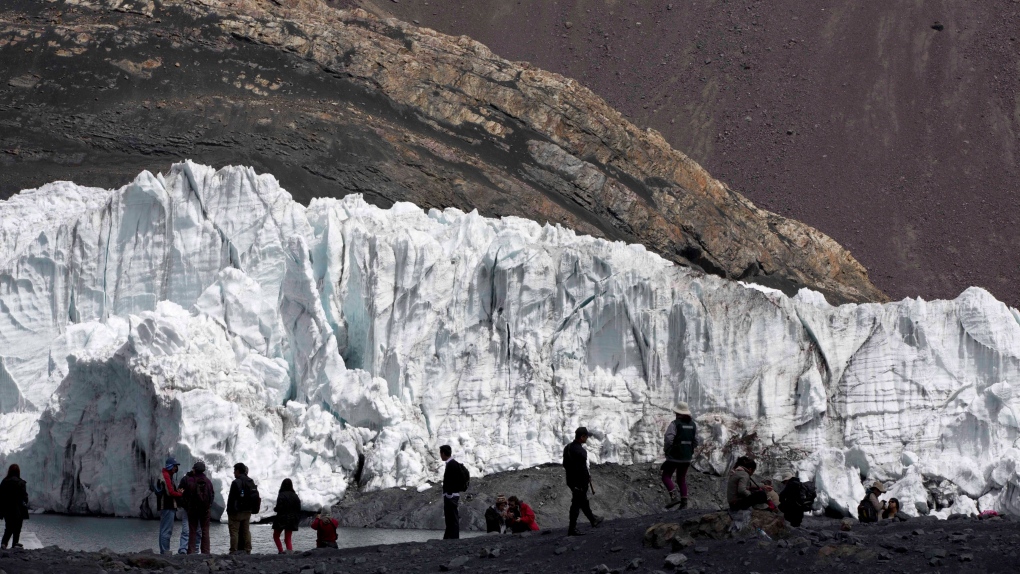
What is a 'halal mortgage'? Does it make housing more accessible?
The 2024 federal budget announced on April 16 included plans to introduce “halal mortgages” as a way to increase access to home ownership.
New research has found that climate change could cause more than 100,000 tonnes of micro-organisms to be released into natural ecosystems every year, a result of melting glaciers in the Northern Hemisphere.
A team of researchers with Aarhus University has analyzed meltwaters from eight glaciers across Europe and North America and two sites in western Greenland, concluding that one millilitre of glacier meltwater contains approximately 10,000 micro-organisms -- mostly consisting of algae, bacteria, viruses, and fungi.
The environmental ramifications of these micro-organisms spreading into global waters remain uncertain.
"Much of the carbon released from the melting glaciers will end up in the rivers supplied by the glaciers, or in the sea,” Ian Stevens, a researcher with the Department of Environmental Science at Aarhus University, said in a news release. “However, we do not yet know whether the microorganisms can be harmful or beneficial, or what consequences the changes in the carbon supply could have for agriculture using the water from glaciers.”
The study also suggested a scenario where up to 0.65 million tonnes of carbon could be released from glaciers in the Northern Hemisphere every year, based on an average temperature increase of around 2.7 C in 2100.
Scientists from Aberystwyth University, in Wales, have also warned that 100,000 tonnes of microbes – noting both harmful and beneficial ones – could also spread throughout downstream ecosystems as glaciers continue to melt.
Tristram Irvine-Fynn, a researcher with Aberystwyth University, said in a news release that “melting glacier ice surfaces host active microbial communities that contribute to melting and biogeochemical cycling, and nourish downstream ecosystems; but these communities remain poorly understood.”
“Over the coming decades, the forecast 'peak water' from Earth's mountain glaciers means we need to improve our understanding of the state and fate of ecosystems on the surface of glaciers,” he added.
“With a better grasp of that picture, we could better predict the effects of climate change on glacial surfaces and catchment biogeochemistry.”
According to the United States Geological Survey (USGS), countless aquatic species require glacier meltwater to survive. This includes aquatic insects that are “fundamental components” of the food web. Changes in stream habitat, USGS warns, may adversely impact aquatic life in ways that affect food supplies on a global scale.

The 2024 federal budget announced on April 16 included plans to introduce “halal mortgages” as a way to increase access to home ownership.
A recent report sheds light on Canadians living abroad--estimated at around four million people in 2016—and the public policies that impact them.
One person was killed in a six-vehicle crash on Highway 400 in Innisfil Friday evening.
An election-year roast of U.S. President Joe Biden before journalists, celebrities and politicians at the annual White House correspondents' dinner Saturday.
It's one thing to say you like Taylor Swift and her music, but don't blame CNN's AJ Willingham's when she says she just 'doesn't get' the global phenomenon.
Ontario is now home to an invasive and toxic worm species that can grow up to three feet long and can be dangerous to small animals and pets.
Harvey Weinstein’s lawyer said Saturday that the onetime movie mogul has been hospitalized for a battery of tests after his return to New York City following an appeals court ruling nullifying his 2020 rape conviction.
Polish President Andrzej Duda says while no decision has been made around whether Poland will host nuclear weapons as part of an expansion of the NATO alliance’s nuclear sharing program, his country is willing and prepared to do so.
A number of LGBQT+2s groups in Central Alberta are pushing back against a request from the Red Deer South UCP constituency to reinstate MLA Jennifer Johnson into the UCP caucus.

As if a 4-0 Edmonton Oilers lead in Game 1 of their playoff series with the Los Angeles Kings wasn't good enough, what was announced at Rogers Place during the next TV timeout nearly blew the roof off the downtown arena.
Mounties in Nanaimo, B.C., say two late-night revellers are lucky their allegedly drunken antics weren't reported to police after security cameras captured the men trying to steal a heavy sign from a downtown business.
A property tax bill is perplexing a small townhouse community in Fergus, Ont.
When identical twin sisters Kim and Michelle Krezonoski were invited to compete against some of the world’s most elite female runners at last week’s Boston Marathon, they were in disbelief.
The giant stone statues guarding the Lions Gate Bridge have been dressed in custom Vancouver Canucks jerseys as the NHL playoffs get underway.
A local Oilers fan is hoping to see his team cut through the postseason, so he can cut his hair.
A family from Laval, Que. is looking for answers... and their father's body. He died on vacation in Cuba and authorities sent someone else's body back to Canada.
A former educational assistant is calling attention to the rising violence in Alberta's classrooms.
The federal government says its plan to increase taxes on capital gains is aimed at wealthy Canadians to achieve “tax fairness.”
 In this Aug. 12, 2016 photo, a group of tourists walk in front of the Pastoruri glacier in a tour called "The Route of Climate Change" in Huaraz, Peru. (AP Photo/Martin Mejia)
In this Aug. 12, 2016 photo, a group of tourists walk in front of the Pastoruri glacier in a tour called "The Route of Climate Change" in Huaraz, Peru. (AP Photo/Martin Mejia)